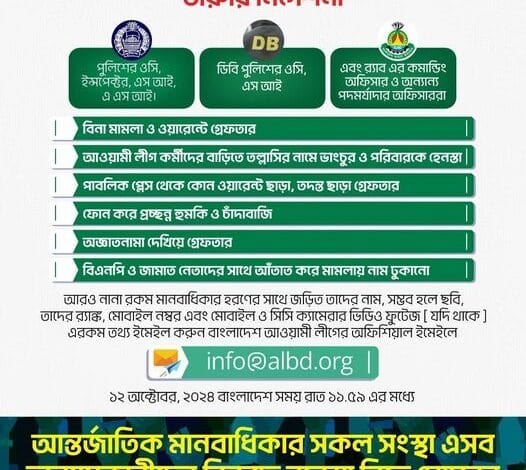Widespread Allegations of Human Rights Violations by Law Enforcement: Awami League Issues Urgent Directive for Public Action
In a move to address mounting allegations of human rights violations, the Awami League has issued an urgent directive to the public, calling for information on law enforcement officials involved

In a move to address mounting allegations of human rights violations, the Awami League has issued an urgent directive to the public, calling for information on law enforcement officials involved in a series of illegal actions. The ruling party has accused several officers from the Bangladesh Police and the Rapid Action Battalion (RAB) of engaging in warrantless arrests, harassment, extortion, and conspiring with opposition forces to undermine political activities. The party is seeking public assistance in gathering information, including names, ranks, and any available evidence, with a deadline set for October 12, 2024.
This directive comes amid growing concerns about the role of law enforcement in Bangladesh, where accusations of abuse of power have surfaced repeatedly in recent years. The Awami League has asked citizens to submit any relevant information to [email protected], hoping to hold accountable those responsible for violating human rights.
Serious Allegations Against Law Enforcement
The directive from the Awami League lists a range of serious accusations against specific members of law enforcement. According to the statement, police officers, detectives, and RAB personnel are involved in activities that infringe upon basic human rights, particularly targeting members and supporters of the ruling party. The accusations include:
- Warrantless Arrests: One of the most severe allegations involves officers arresting individuals without any formal case or warrant. The directive highlights a pattern of unlawful detentions, where citizens, often affiliated with the Awami League, are arrested without any legal basis. These arrests reportedly take place in public locations such as markets and streets, with no prior investigation or formal charge against the detainees.
- Harassment During Raids: The statement also accuses officers of raiding the homes of Awami League workers under false pretences, during which they allegedly vandalise property and harass family members. These raids are often framed as searches, but the party claims that law enforcement uses them as opportunities to intimidate political activists and their families. This practice has created widespread fear among Awami League members, particularly at the grassroots level, where such intimidation tactics are reportedly common.
- Phone Threats and Extortion: Another serious charge involves the use of phone calls to issue implicit threats or demand money. Several officers are accused of extorting individuals through these threats, pressuring them into paying bribes to avoid legal trouble. Victims have reportedly been told they would face fabricated charges or further harassment if they did not comply with these demands.
- Anonymous Arrests: Law enforcement officials are also accused of arresting individuals under anonymous or vague charges. This practice, often referred to as “arrest under anonymous charges,” allows officers to detain people without revealing the specific accusations or legal grounds. It has become a concerning trend in Bangladesh, as it erodes citizens’ trust in the justice system and leaves many in a state of legal uncertainty.
- Collusion with Opposition Parties: Perhaps the most politically charged accusation is the claim that certain officers have been conspiring with opposition groups, particularly the Bangladesh Nationalist Party (BNP) and Jamaat-e-Islami. According to the Awami League, these officers have helped opposition leaders by falsely implicating Awami League members in legal cases, thereby undermining the party’s political standing. This alleged collusion has raised concerns about the impartiality of law enforcement in the country, especially as political tensions continue to rise.
Public Appeal for Information
In its directive, the Awami League urges the public to come forward with any information related to these allegations. The party specifically asks for names, ranks, mobile numbers, photos, and any available mobile or CCTV footage of the officers involved in these activities. The information, which is to be sent via email, will be used to hold accountable those responsible for human rights violations. The party also stated that they have already received some names and evidence from concerned citizens and thanked those who have contributed.
The deadline for submitting information is October 12, 2024, by 11:59 PM Bangladesh time. According to the Awami League, the gathered information will be shared with international human rights organisations, many of which have expressed concern over the conduct of Bangladesh’s law enforcement agencies in recent years.
International Scrutiny and Human Rights Concerns
The call for public cooperation in identifying law enforcement officers involved in these activities comes at a time when Bangladesh’s human rights record is under increasing international scrutiny. Human rights organisations such as Amnesty International, Human Rights Watch, and the United Nations have raised concerns about extrajudicial killings, enforced disappearances, and arbitrary arrests by law enforcement agencies in the country.
In particular, the RAB has faced repeated allegations of involvement in serious human rights abuses, including extrajudicial killings and torture. The force, which was initially established to combat terrorism and serious crime, has often been accused of overstepping its authority and operating with impunity. Many human rights groups have called for greater oversight of the RAB, as well as reforms to ensure that law enforcement officers are held accountable for their actions.
The Awami League’s directive is likely to attract significant attention from these international organisations, many of which have been advocating for increased accountability within Bangladesh’s law enforcement agencies. The party’s decision to publicly seek out information and evidence from the public suggests a growing acknowledgment of the need to address these allegations head-on.
Political Implications
While the Awami League’s directive focuses on human rights violations, it also has important political implications. By addressing these issues, the ruling party is sending a clear message that it does not condone the abuse of power by law enforcement officials, even those who may have previously been perceived as loyal to the government.
However, critics argue that the timing of this directive may be politically motivated. With national elections approaching, the Awami League could be seeking to distance itself from any negative associations with law enforcement agencies, particularly as allegations of misconduct continue to rise. By calling out specific officers and asking the public for assistance, the party may be attempting to bolster its image as a defender of justice and human rights.
Opposition groups, meanwhile, may interpret this move as an attempt to deflect attention from broader concerns about government accountability and the treatment of political opponents. The BNP and Jamaat-e-Islami, both of which have been implicated in the directive, are likely to challenge the Awami League’s narrative and accuse the party of using law enforcement for its own political gain.
Conclusion
As the October 12 deadline approaches, the Awami League’s directive has set the stage for a critical moment in Bangladesh’s political and human rights landscape. The accusations levelled against law enforcement officials are serious and demand thorough investigation and accountability. Whether the Awami League’s efforts to gather information from the public will lead to meaningful reforms remains to be seen.
In the meantime, the directive has sparked an important conversation about the role of law enforcement in upholding the rule of law and protecting the rights of all citizens. International human rights organisations are likely to monitor the situation closely, and the outcome of this public appeal could have far-reaching consequences for both the Awami League and Bangladesh’s law enforcement agencies. The eyes of the nation—and the world—are now focused on what steps will be taken next.
